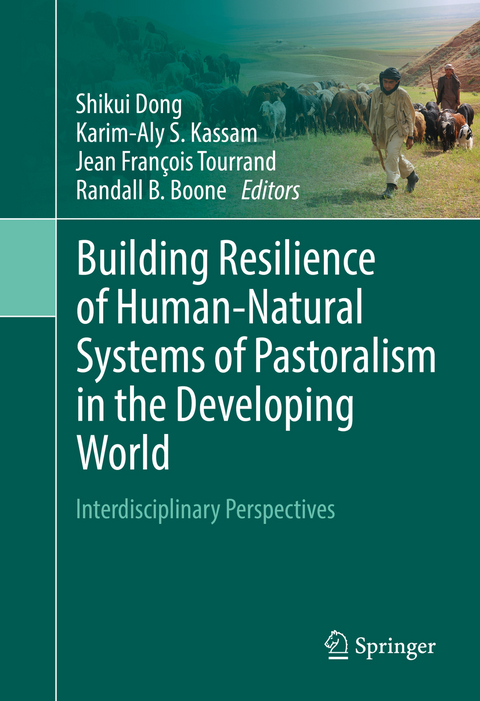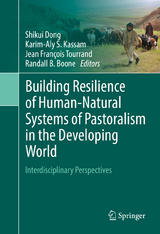Building Resilience of Human-Natural Systems of Pastoralism in the Developing World
Springer International Publishing (Verlag)
978-3-319-30730-5 (ISBN)
The second goal is to argue that breaking coupled human-natural systems of pastoralism leads to degradation of pastoral ecosystems and to create an analysis framework to assess the vulnerability of worldwide pastoralism. Our analysis framework provides approaches to help comprehensively understand the transitions and the impacts of human-natural systems in the pastoral regions in the world.
The third goal is to identify the successful models in promoting coupled human-natural systems of pastoralism, and to learn lessons of breaking coupled human-cultural pastoralism systems through examining the representative cases in regions including Central Asia, Southern and Eastern Asia, Northern and Eastern Africa, the European Alps and South America.
The fourth goal is to identify the strategies to build the resilience of the coupled human-natural systems of pastoralism worldwide. We hope that our book can facilitate the further examination of sustainable development of coupled human-natural systems of pastoralism by providing the summaries of existing data and information related to the pastoralism development, and by offering a framework for better understanding and analysis of their social, economic and environmental implications.
Dr.Dong Shikui is currently a full Professor at School of Environment, Beijing Normal University and an Adjunct Professor at Natural Resource Department of Cornell University, as well as a fellow of India China Institute and New School, New York. He completed his undergraduate and graduate studies in Grassland Science from Gansu Agricultural University in 1995 and 1998, respectively; he received his PhD in Grassland Ecology from Gansu Agricultural University in 2001; and he completed his post-doc program in Natural Sciences at Beijing Normal University in 2003.Dr. Karim-Aly S. Kassam is International Professor of Environmental and Indigenous Studies in the Department of Natural Resources and the American Indian Program at the College of Agriculture and Life Sciences, Cornell University. He is Associate Professor in the Department of Natural Resources and the American Indian Program.Dr. Randall B. Boone is a Research Scientist at the Natural Resource Ecology Laboratory and Professor in the Department of Ecosystem Science and Sustainability at Colorado State University.Dr. Jean François Tourrand is a Senior Researcher at the Centre de Coopération Internationale en Recherche Agronomiquepour le Développement (CIRAD) in France.
Chapter 1 Overview: Pastoralism in the world.- Chapter 2 Vulunerability and resilience of coupled HUMAN-NATURAL systems of worldwide pastoralism.- Chapter 3 Maintaining Coupled HUman-natural system of pastoralism in himalayas of South Asia.- Chapter 4 Sociocultural and Ecological Systems of Pastoralism in Central Asia: Cases from the Altay and Tianshanof Xinjiang and Inner Mongolia of China and the Pamir Mountains of Badakhshan, Afghanistan.- Chapter 5 Building New Coupled Human-natural Systems for Sustainable Pasture Management in South America.- Chapter 6 Adaptation and Resilience in Pastoral Management of Mediterranean Bedouin Socio-Ecosystem in the NWCZ, Egypt.- Chapter 7 Modelling Coupled Human-Natural Systems of Pastoralism in East Africa.- Chapter 8 Conclusion
| Erscheinungsdatum | 08.10.2016 |
|---|---|
| Zusatzinfo | XII, 298 p. 111 illus., 91 illus. in color. |
| Verlagsort | Cham |
| Sprache | englisch |
| Maße | 155 x 235 mm |
| Themenwelt | Naturwissenschaften ► Biologie ► Botanik |
| Naturwissenschaften ► Biologie ► Ökologie / Naturschutz | |
| Recht / Steuern ► EU / Internationales Recht | |
| Schlagworte | Biomedical and Life Sciences • Conservation Biology/Ecology • Developing Countries • Environmental change • Environmental Geography • Environmental Law/Policy/Ecojustice • Environmental Management • landscape ecology • Pastoralism • Resilience • Sustainable • sustainable development |
| ISBN-10 | 3-319-30730-4 / 3319307304 |
| ISBN-13 | 978-3-319-30730-5 / 9783319307305 |
| Zustand | Neuware |
| Haben Sie eine Frage zum Produkt? |
aus dem Bereich




